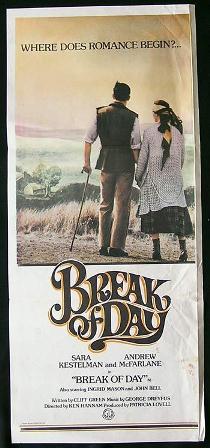
BREAK OF DAY
Australia, 1976, 112 minutes, Colour.
Sara Kestelman, Andrew Mc Farlane, Ingrid Mason, Tony Barry, John Bell, Denis Olsen.
Directed by Ken Hannam.
Break of Day: while the plot is slight: injured Anzac, uneasy in work, town and home five years later, encounters an unconventional artist – the treatment of character, situation and atmosphere is fine indeed. The strength is in Cliff Green's screenplay and the beauty of Maldon and its surroundings as the 1920s town. Andrew Mc Farlane is quite credible as Tom, who disappoints his pregnant wife, scandalises the town and redeems himself at one of the lengthiest but most entertaining cricket matches on film. Sarah Kestelman is excellent as Alice the artist. The Gallipoli sequences look too contrived and the film remains at the level of story and evocation rather than exploration, but is worth seeing.
1. The significance of the title? Its meaning? Visuals?
2. The importance of the authentic atmosphere: the countryside, Maldon, the 1920s? The contrast with Gallipoli? The town, the home, the details of the picnic? flow did the atmosphere make the events and characters more credible?
3. The impact of the Gallipoli opening, its overtones, Australian myths, the army, violence? The emphasis on Australian masculinity and proving oneself? The importance of Gallipoli being reprised at the end? The horror and violence and gore in the war? The shooting, the scaling of the wall? The importance of the revelation that Tom shot his own foot? Was this the right place in the film for this explanation? Did it help to explain Tom? A jolting of the Australian myth and belief?
4. How interesting a character was Tom? Could audiences identify with him? How much a hero of the film, a non-hero? A lost man? As we saw him at the opening, sympathy, alone in the early morning, the shooting of the rabbits and the emphasis on violence and self-assertion, his being a cripple, some agility? His shyness and awkwardness, his pleasure at being alone in the country? The contrast with his work, his seeming offhandedness as the paper, sloppiness, self-will against
the traditions and Inherited values?
3. What was Tom's role in the town: people's regard for his injury and war record, their regret that he wasn't still the sports champion? A man of promise in the town? The schoolboys' regard for him? The picturing of Tom at home, as a husband, his wife's pregnancy, her illness, the lack of communication? How ordinary a husband and a man was Tom?
4. The maid indicating her attitude towards the wife's sickness? The wife trying to cope, her illness and pregnancy, her desire to communicate? Her inability to hold her husband? Her disappointment?
7. The drama of the encounter with Alice? The nature of Tom's surprise, the situation, the person, surprise at his own reactions?
8. How attractive a woman was Alice? Her warmth, her personality, her welcoming of Tom, her receptivity? Her bohemian background, her age, her painting and her skill? The fact that she was so uninhibited compared with Tom? The importance of her painting Tom so much?
9. The credibility of the encounter and the growth in friendship? What did they share together out in the countryside, the warmth of the relationship, its blossoming into love, its sexual consummation? The effect on Alice? The effect on Tom?
10. The town's reaction to the affair? The chorus of the schoolboys, especially the fat one? People's gossiping, the work partner and his comments? The effect on Tom's wife? His willing, involvement while trying to pretend to keep face?
11. How did the cricket match bring things to a head? Why was it so interesting as a piece of filming? The attention to detail, be people, picnic atmosphere, rivalry for the two teams, ordinary people playing cricket? Tom and his becoming a hero at the match? The importance of Alice and her bohemian friends being there?
12. How was the town life counter pointed by Arthur and Alice's other friends? The splash of their arrival, their showy way of life and behaviour, their snobbery, attitude towards country yokels? Their admiration for Alice and her paintings? Curiosity about Tom? The splash in the town with the nude swimming and people's reactions? Their raucous behaviour? Their boredom at the cricket match? The contrast of their attitudes and values to those of the people in the town?
13. The importance of the fight at the cricket match, especially Arthur's involvement? The drinking aftermath and the Australian type of heroism? The discussion about the war, its effect on Tom? Tom as drunk and the effect on him?
14. Tom trying to salvage his relationship with Alice, the presentation of Alice and the rather permissive way of life of herself and her friends, sexuality? Tom out alone drunk and trying to cope? his confrontation of the permissive way of life and its effect on him?
15. How alone was Tom at the end of the film, during the night, trying to find his own 'break of day', the insertion of the Gallipoli revelation at this point?
16. The pathos of Alice leaving? The effect of this experience on her, the effect on Tom? His decision to chase her in the car? His missing the train and stopping at the crossroads at break of day?
17. How good a portrait of an Australian man at the turn of the century in terms of understanding, values, crises and decisions?